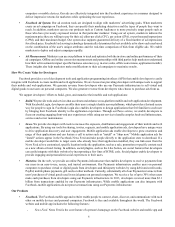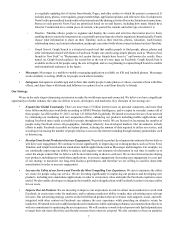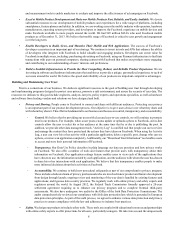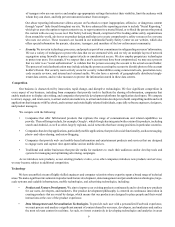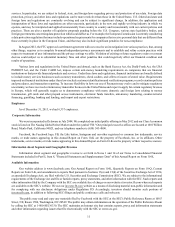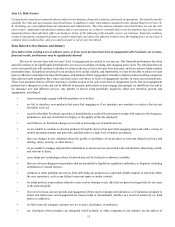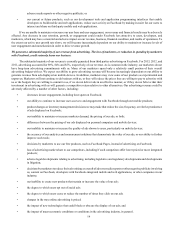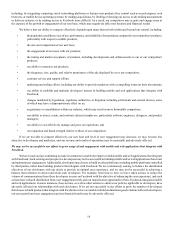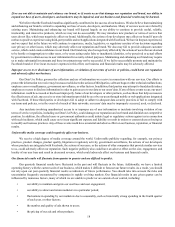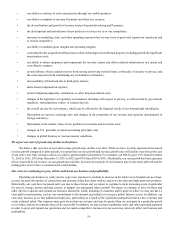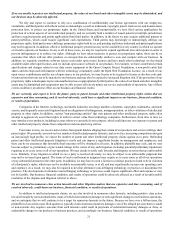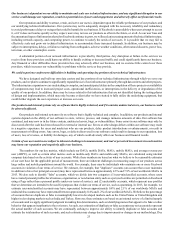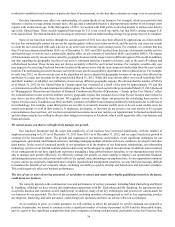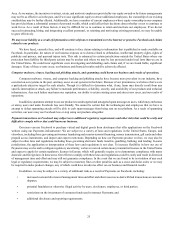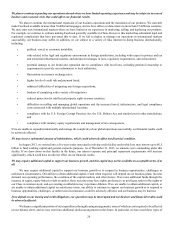Facebook 2013 Annual Report Download - page 18
Download and view the complete annual report
Please find page 18 of the 2013 Facebook annual report below. You can navigate through the pages in the report by either clicking on the pages listed below, or by using the keyword search tool below to find specific information within the annual report.16
including: by integrating competing social networking platforms or features into products they control such as search engines, web
browsers, or mobile device operating systems; by making acquisitions; by limiting or denying our access to advertising measurement
or delivery systems; or by making access to Facebook more difficult. As a result, our competitors may acquire and engage users at
the expense of the growth or engagement of our user base, which may negatively affect our business and financial results.
We believe that our ability to compete effectively depends upon many factors both within and beyond our control, including:
• the popularity, usefulness, ease of use, performance, and reliability of our products compared to our competitors' products,
particularly with respect to mobile products;
• the size and composition of our user base;
• the engagement of our users with our products;
• the timing and market acceptance of products, including developments and enhancements to our or our competitors'
products;
• our ability to monetize our products;
• the frequency, size, quality, and relative prominence of the ads displayed by us or our competitors;
• customer service and support efforts;
• marketing and selling efforts, including our ability to provide marketers with a compelling return on their investments;
• our ability to establish and maintain developers' interest in building mobile and web applications that integrate with
Facebook;
• changes mandated by legislation, regulatory authorities, or litigation, including settlements and consent decrees, some
of which may have a disproportionate effect on us;
• acquisitions or consolidation within our industry, which may result in more formidable competitors;
• our ability to attract, retain, and motivate talented employees, particularly software engineers, designers, and product
managers;
• our ability to cost-effectively manage and grow our operations; and
• our reputation and brand strength relative to those of our competitors.
If we are not able to compete effectively, our user base and level of user engagement may decrease, we may become less
attractive to developers and marketers, and our revenue and results of operations may be materially and adversely affected.
We may not be successful in our efforts to grow usage of and engagement with mobile and web applications that integrate with
Facebook.
We have made and are continuing to make investments to enable developers to build mobile and web applications that integrate
with Facebook. Such existing and prospective developers may not be successful in building mobile and/or web applications that create
and maintain user engagement. Additionally, developers may choose to build on other platforms, including mobile platforms controlled
by third parties, rather than building products that integrate with Facebook. We are continuously seeking to balance the distribution
objectives of our developers with our desire to provide an optimal user experience, and we may not be successful in achieving a
balance that continues to attract and retain such developers. For example, from time to time, we have taken actions to reduce the
volume of communications from these developers to users on Facebook with the objective of enhancing the user experience, and such
actions have reduced distribution from, user engagement with, and our monetization opportunities from, Facebook-integrated mobile
and web applications. In some instances, these actions, as well as other actions to enforce our policies applicable to developers, have
adversely affected our relationships with such developers. If we are not successful in our efforts to grow the number of developers
that choose to build products that integrate with Facebook or if we are unable to build and maintain good relations with such developers,
our user growth and user engagement and our financial results may be adversely affected.


